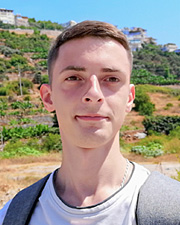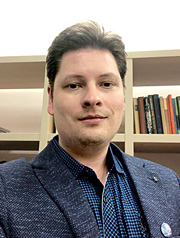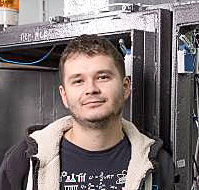
Electronic english version since 2022 |
The newspaper was founded in November 1957
| |
Youth and science
Scientific achievements highlighted
Twelve JINR staff members
became winners of the AYSS Prize for 2023
The initiator of the organization of the award in 2005 became the Council of the JINR AYSS - an association of students, graduate students, young scientists and specialists of the Institute, engaged in proactive scientific work and the development of professional contacts with scientific and student organizations. It was then decided that the most significant experimental, theoretical, methodological and applied papers on JINR topics at the level of modern science should be awarded and such a prize became an additional financial mechanism for stimulating talent in science. In 2005, "young" scientists were under 33 years of age; today, the prize is awarded to researchers under 35 years of age.
During the year, AYSS holds two large international conferences. The first is in Alushta that usually is held in early summer, the second is the AYSS conference, held in autumn. At each meeting, a jury consisting of a programme committee that includes leading scientists of the Institute, selects the best reports in each section. Based on the results of this selection, the authors of the best reports enter the second round of the competition for the prize. In the second round, scientific secretaries are appointed as jury members from each laboratory. As a result, the jury announces 12 names of young scientists and specialists that have become the best in their field throughout the year.
In 2023, Maxim Zakharov (FLNP) won the nomination "Research theoretical papers" with his paper, the second place was given to Vyacheslav Saiko (FLNR), the third - to Maxim Bezuglov (BLTP). In the nomination "Research experimental papers", the best was Regina Kozhina (LRB), the second place went to Ersultan Arynbek (FLNP), the third place was shared by Daria Shamina (LRB) and Olga Lis (FLNP). The winner of "gold" in the nomination "Methodological and technological papers" was Vladislav Rozhkov (DLNP) and the "bronze" was won by Aizat Daribayeva (VBLHEP). And finally, Dmitry Pugachev (FLNR) won in the category "Research and applied papers", the second place was shared by Timofey Smolyanin (VBLHEP) and Daria Pryakhina (MLIT).
 We congratulate the scientists on their well-deserved award and wish them further success!
We congratulate the scientists on their well-deserved award and wish them further success!
Dmitry Pugachev, a senior engineer of the Sector of Ion Sources of the Scientific and Technological Department of Accelerators of FLNR, presented a paper on obtaining metal ions from the ECR source of the DC-280 accelerator of the Superheavy Element Factory. The paper is dedicated to the optimization of operating DECRIS-PM ECR source systems, the development of new devices and the investigation of techniques to increase the intensity of the resulting metal ions for implementing experiments on the synthesis and investigation of the properties of superheavy elements.
The basic part of Dmitry's paper is closely related to the operation, modernization and development of ECR ion sources, as well as the search for ways to optimize equipment to improve the quality of experiments.
 Maxim Zakharov, a researcher at the Sector of Research of Fundamental Properties of Neutrons of FLNP, won a prize for his paper on optimization technique for numerical solution of the non-stationary Schrodinger equation.
Maxim Zakharov, a researcher at the Sector of Research of Fundamental Properties of Neutrons of FLNP, won a prize for his paper on optimization technique for numerical solution of the non-stationary Schrodinger equation.
The technique is based on the application of the Lee-Trotter-Suzuki formula to approximate the evolution operator. Optimization allowed to reduce the number of mathematical operations by half for high-order accuracy algorithms. The application of the technique to address various non-stationary quantum issues is presented in the paper.
Maxim's areas of scientific interest include theoretical and experimental research on non-stationary quantum phenomena in the optics of ultracold neutrons, the development of techniques for the numerical solution of the non-stationary Schrodinger equation and the investigation of the evolution of non-stationary quantum systems. At the Institute, the young scientist is engaged in computational and mathematical support for experiments on the research of non-stationary quantum effects in the physics of ultracold neutrons, theoretical research of fundamental problems of ultracold neutron optics, development of a software product for the numerical solution of the non-stationary Schrodinger equation using distributed computing tools.
 Vladislav Rozhkov, a researcher at the Department of Colliding Beams at DLNP, was awarded a prize for the development of micro-SPECT and multi-energy computed tomography techniques.
Vladislav Rozhkov, a researcher at the Department of Colliding Beams at DLNP, was awarded a prize for the development of micro-SPECT and multi-energy computed tomography techniques.
Together with the Faculty of Chemistry and the Faculty of Fundamental Medicine of Moscow State University, lanthanide-based contrast agents were developed and tested as contrasts for "color" tomography. Using this data together with information obtained from SPECT investigations in the future will improve the speed and quality of development of new drugs.
In his department, together with his colleagues, Vladislav is engaged in research, development, calibration of semiconductor pixel detectors, as well as the development of techniques and criteria for recognizing chemical elements using tomography. His scientific interests include medical physics, semiconductor detectors and investigation of tomographic research techniques that are widely used not only in medicine but also, for instance, in geology.
 Regina Kozhina, a junior researcher at the Department of Radiation Biology and Physiology of LRB, presented her paper "Development of DNA damage in mammalian neuronal cells under the action of protons" for the competition.
Regina Kozhina, a junior researcher at the Department of Radiation Biology and Physiology of LRB, presented her paper "Development of DNA damage in mammalian neuronal cells under the action of protons" for the competition.
The results of in vivo and in vitro experiments over several years that were dedicated to the issues of what DNA damage is developed and how it is repaired over time in neuronal cells, namely the hippocampal and cerebellar cells of small rodents under the impact of various types of ionizing radiation are presented in the research.
This area of work is part of the research of the scientific group of the Sector of Molecular Radiobiology of the Department of LRB, where Regina works. The purpose of these investigations is to study the efficiency of the effects of ionizing radiation of different qualities on biological objects at the molecular level. And one of these techniques is the use of DNA synthesis inhibitors that allows to influence the repair processes, thereby fixing molecular damage, that in turn, can increase the efficiency of radiation therapy for oncological diseases.
Ksenia MORUNOVA